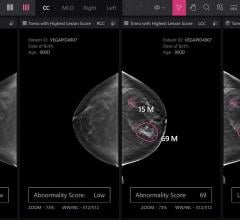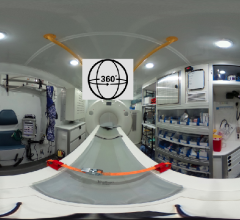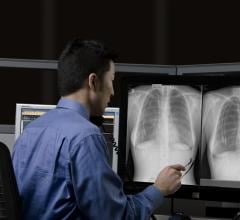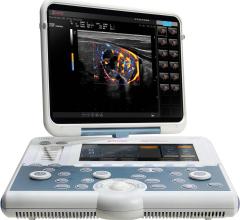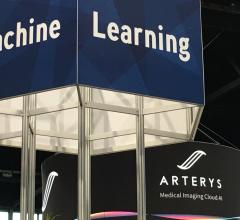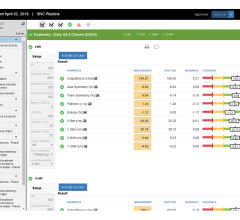You may have noticed a few changes when this issue of ITN arrived in your mail! This issue debuts our new look, which ...
Since 2009, approximately 450,000 women around age 70 in the United Kingdom did not receive final breast screening invitations due to a computer failure, according to a statement from Public Health England. The National Health Service (NHS) is now offering catch-up screening exams for up to 309,000 women ages 70-79 who missed the exam and are registered with a general practitioner (GP).
This is a 360 degree image from the Canon Aquilion One 320-slice computed tomography (CT) system installed at ...
Radiology departments have many different needs and face a wide variety of challenges that can impact their departments ...
The Board of Directors of the Radiological Society of North America (RSNA) announced that Charles E. Kahn Jr., M.D., M.S., will become editor of the new online journal, Radiology: Artificial Intelligence. The new journal will highlight emerging applications of machine learning and artificial intelligence (AI) in the field of imaging across multiple disciplines. It will provide a way to keep practicing physicians and imaging researchers up to date on the best emerging science in this subspecialty.
Canon Medical Systems Europe B.V. has signed a reseller agreement with the Swedish medical device company Arcoma, allowing Canon Medical Systems to sell the high-end digital X-ray systems Aceso and Aceso+ in Europe.
Overlake Medical Center in Bellevue, Wash., announced it has enrolled 85 patients in a pilot study of a blood test to assess breast cancer sisk. The test may determine which women with abnormal or inconclusive screening mammography results are at low risk for invasive breast cancer. This technology, requiring a simple blood draw, will help physicians assess the likelihood of invasive cancer or precancerous lesions with difficult-to-interpret mammogram images, thus potentially reducing the need for invasive biopsies.
Despite decades of progress in breast imaging, one challenge continues to test even the most skilled radiologists ...
This is a 360 degree view inside the back of the Northwestern Medicine Central DuPage Hospital Mobile Stroke Unit ...
James K. Min, M.D., FSCCT, has been selected for a five-year term as the new editor-in-chief of the Journal of Cardiovascular Computed Tomography (JCCT). He in turn has named Todd C. Villines, M.D., FSCCT, as executive editor along with Gudrun Feuchtner, M.D.
Cerebrovascular imaging analysis company iSchemaView received final clearance from the U.S. Food and Drug Administration (FDA) for Rapid CTA, the company’s 3-D imaging solution for computed tomography angiography. Rapid CTA is the newest addition to iSchemaView’s neuroimaging platform — including Rapid CTP and Rapid MRI — which is designed to provide physicians with fast, fully-automated and easy-to-interpret imaging that facilitates clinical decision making around cerebrovascular disease, such as stroke.
Bayer Radiology’s Barbara Ruhland and Thom Kinst discuss how radiology departments can address the many different ...
A 360 degree view of an automated breast ultrasound (ABUS) exam room at Northwestern Medicine Central DuPage Hospital ...
Automated breast density evaluation was just as accurate in predicting women’s risk of breast cancer, found and not found by mammography, as subjective evaluation done by radiologists, according to a new study. The study was led by researchers at the University of California San Francisco (UCSF) and Mayo Clinic.
Patients benefit when providers and technology work together. That may be especially so with the arrival of artificial ...
eHealth Saskatchewan plays a vital role in providing IT services to patients, health care providers, and partners such ...
The acquisition of biomedical equipment company Esaote SpA’s share capital was completed on April 19, the company recently announced, by a consortium of leading Chinese investors. The consortium is composed of major companies in the medical and healthcare technology sectors, as well as investment funds with significant experience in this field.
ViewRay Inc. announced new magnetic resonance imaging (MRI) technologies under development for its MRIdian Linac radiotherapy system. Designed to improve tumor and soft tissue visualization, these enhancements to MRIdian's SmartVision MR image guidance are expected to further improve the precision by which radiation is delivered to treat cancer.
ITN Associate Editor Jeff Zagoudis explores how the mobile stroke unit (MSU) program at Northwestern Medicine Central ...
Computer technology company NVIDIA and Canon Medical Systems announced a new partnership to develop the research infrastructure for enhanced artificial intelligence (AI) in healthcare. The partners hope to make a significant contribution to promoting the use of data-intensive deep learning techniques in medical and related research, as well as to drive the uptake of AI in the healthcare sector.
There are no laboratory tests to diagnose migraines, depression, bipolar disorder and many other ailments of the brain. Doctors typically gauge such illnesses based on self-reported symptoms and behavior. Now, a new study shows that a kind of brain scan called functional connectivity magnetic resonance imaging (fcMRI), which shows how brain regions interact, can reliably detect fundamental differences in how individual brains are wired. As such, the technique potentially could be used to distinguish healthy people from people with brain diseases or disorders, and provide insight into variations in cognitive ability and personality traits.
For the first time, cancer patients in the Washington, D.C. metropolitan region have access to proton therapy, now available at the MedStar Georgetown University Hospital Proton Therapy Center.
The U.S. Navy hospital ship USNS Mercy took part in a mass casualty drill April 23, 2018, during which the crew simulated computed tomography (CT) scans.
Sun Nuclear Corp. released significant new functionality for its SunCheck Platform for patient and machine quality assurance (QA) in radiation therapy. Designed to support a broad range of planning and delivery technologies, SunCheck 2.0 streamlines and standardizes workflows, allowing greater overall focus on patient safety.


 May 03, 2018
May 03, 2018 




